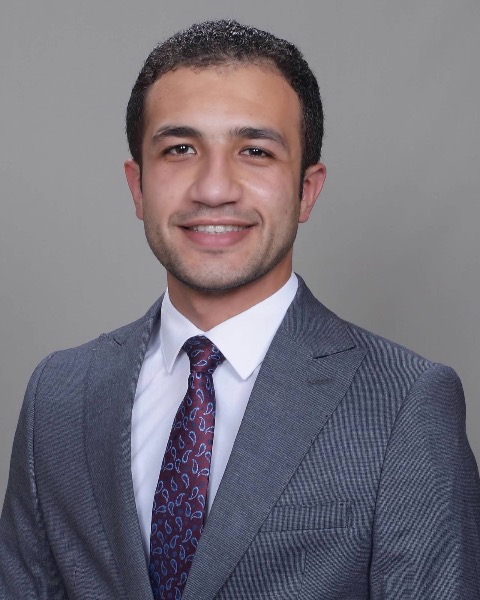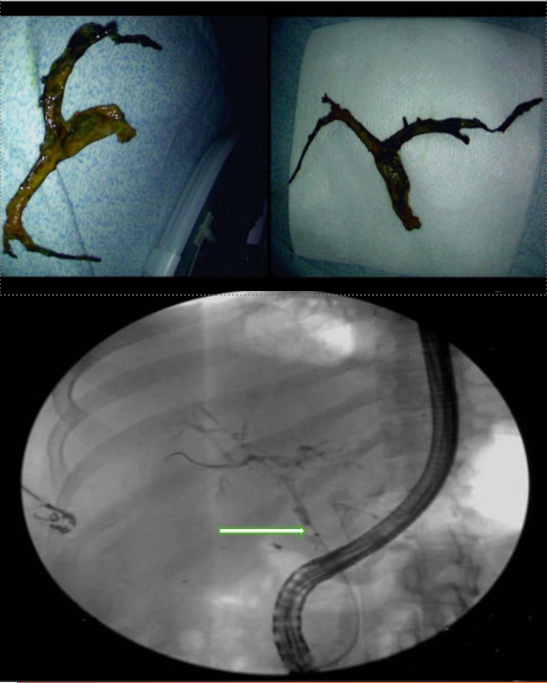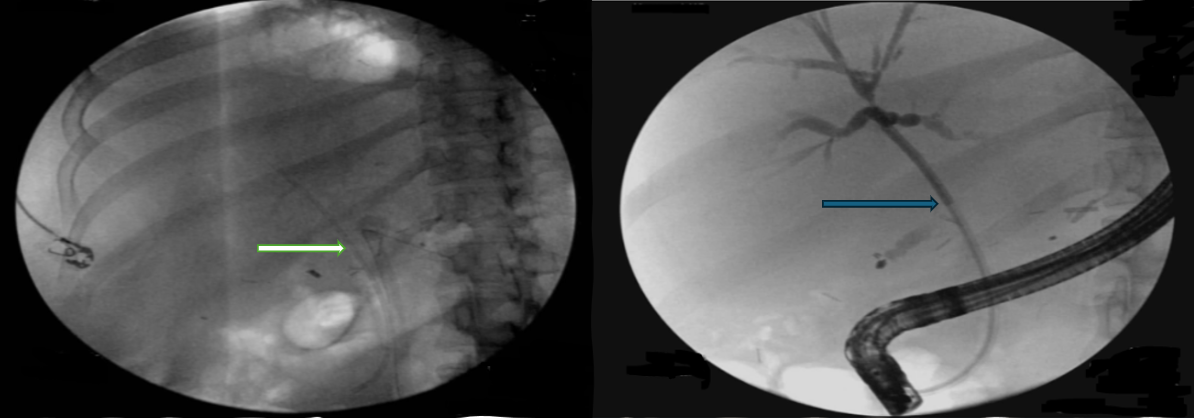Monday Poster Session
Category: Biliary/Pancreas
P2378 - A Rare Case of Biliary Cast Syndrome After Orthotopic Liver Transplantation
Monday, October 27, 2025
10:30 AM - 4:00 PM PDT
Location: Exhibit Hall

Abdelrhman Refaey, MD
Division of Gastroenterology and Liver Disease, Department of Medicine, George Washington University School of Medicine and Health Sciences
Teaneck, NJ
Presenting Author(s)
Abdelrhman Refaey, MD1, Ahmed Attia, MD2, Ahmed Ebeid, MD2, Mohamed Abdou, MD2, Stephen Gray, MD, MsPH3, Ameer Abutaleb, MD3
1Division of Gastroenterology and Liver Disease, Department of Medicine, George Washington University School of Medicine and Health Sciences, Washington, DC; 2Transplant Institute, Department of Surgery, George Washington University School of Medicine and Health Science, Washington, DC; 3The George Washington Transplant Institute, Department of Surgery, The George Washington University Hospital, Washington, DC
Introduction: Bile cast syndrome (BCS) is a rare but serious complication of orthotopic liver transplantation (OLT), seen in up to 4-18 % of recipients. Its pathophysiology is unclear but likely involves a blood supply-demand mismatch, such as a hepatic artery thrombosis or liver graft hilum narrowing. It typically presents as common bile duct obstruction with or without cholangitis. We present a case of BCS that occurred 9 weeks after receiving liver transplant.
Case Description/
Methods: A 48-year-old woman underwent an OLT for Alcohol-induced acute liver failure in the setting of decompensated cirrhosis (MELD > 41). Post-transplant immunosuppression included Methylprednisolone, mycophenolate mofetil, and tacrolimus. Two weeks later, she presented with abdominal pain and leukocytosis (WBC 46K). CT abdomen showed a moderate volume of intraperitoneal fluid. A drain was placed, and cholangiogram revealed bile leakage from cystic duct remnant into perihepatic space. One week later, she was admitted with severe anemia (Hb 5.9 g/dl) for which she received multiple transfusions. CT Abdomen revealed a 25 cm perihepatic biloma. Four days later, she was readmitted with severe anemia (Hb 6 g/dl), and a low reticulocyte count raised concern for bone marrow suppression. EGD revealed a non-bleeding gastric ulcer. She experienced cardiac arrest with successful resuscitation and was admitted to the ICU. She developed septic shock with positive blood cultures for MRSE, VRE, and gram-negative bacteria. ERCP was performed to address a possible bile leak and suspected ascending cholangitis. It revealed a proximally migrated, occluded biliary stent, which was removed.
At nine weeks post-transplant, she presented with jaundice and abdominal pain. Labs showed cholestasis (total bilirubin 4.8 mg/dL, ALP 948, GGT of 1254, AST 216, ALT 350). ERCP revealed filling defects in the left and right hepatic ducts and all intrahepatic branches, indicative of biliary casts. Lithotripsy failed, but spybite basket removed a large cast. A biliary stent was placed with good bile flow.
Discussion: Biliary Cast Syndrome (BCS) post-transplant is associated with significant morbidity and mortality. Risk factors include ischemia, rejection, infection, and bile leaks. In this case, severe anemia, prolonged CPR, and biloma may have contributed to biliary ischemia and cast development. BCS typically presents within 3–12 months post-transplant; our patient presented at 9 weeks. Early recognition is essential for timely intervention and improved outcomes.

Figure: ERCP showing a biliary system filling defect that extends to the left and right hepatic ducts and all intrahepatic branches (green arrow), along with a gross picture of the cast after removal.

Figure: ERCP after removal of the cast shows stent in a good position (green arrow) and normal flow of bile through the stent (blue arrow)
Disclosures:
Abdelrhman Refaey indicated no relevant financial relationships.
Ahmed Attia indicated no relevant financial relationships.
Ahmed Ebeid indicated no relevant financial relationships.
Mohamed Abdou indicated no relevant financial relationships.
Stephen Gray indicated no relevant financial relationships.
Ameer Abutaleb indicated no relevant financial relationships.
Abdelrhman Refaey, MD1, Ahmed Attia, MD2, Ahmed Ebeid, MD2, Mohamed Abdou, MD2, Stephen Gray, MD, MsPH3, Ameer Abutaleb, MD3. P2378 - A Rare Case of Biliary Cast Syndrome After Orthotopic Liver Transplantation, ACG 2025 Annual Scientific Meeting Abstracts. Phoenix, AZ: American College of Gastroenterology.
1Division of Gastroenterology and Liver Disease, Department of Medicine, George Washington University School of Medicine and Health Sciences, Washington, DC; 2Transplant Institute, Department of Surgery, George Washington University School of Medicine and Health Science, Washington, DC; 3The George Washington Transplant Institute, Department of Surgery, The George Washington University Hospital, Washington, DC
Introduction: Bile cast syndrome (BCS) is a rare but serious complication of orthotopic liver transplantation (OLT), seen in up to 4-18 % of recipients. Its pathophysiology is unclear but likely involves a blood supply-demand mismatch, such as a hepatic artery thrombosis or liver graft hilum narrowing. It typically presents as common bile duct obstruction with or without cholangitis. We present a case of BCS that occurred 9 weeks after receiving liver transplant.
Case Description/
Methods: A 48-year-old woman underwent an OLT for Alcohol-induced acute liver failure in the setting of decompensated cirrhosis (MELD > 41). Post-transplant immunosuppression included Methylprednisolone, mycophenolate mofetil, and tacrolimus. Two weeks later, she presented with abdominal pain and leukocytosis (WBC 46K). CT abdomen showed a moderate volume of intraperitoneal fluid. A drain was placed, and cholangiogram revealed bile leakage from cystic duct remnant into perihepatic space. One week later, she was admitted with severe anemia (Hb 5.9 g/dl) for which she received multiple transfusions. CT Abdomen revealed a 25 cm perihepatic biloma. Four days later, she was readmitted with severe anemia (Hb 6 g/dl), and a low reticulocyte count raised concern for bone marrow suppression. EGD revealed a non-bleeding gastric ulcer. She experienced cardiac arrest with successful resuscitation and was admitted to the ICU. She developed septic shock with positive blood cultures for MRSE, VRE, and gram-negative bacteria. ERCP was performed to address a possible bile leak and suspected ascending cholangitis. It revealed a proximally migrated, occluded biliary stent, which was removed.
At nine weeks post-transplant, she presented with jaundice and abdominal pain. Labs showed cholestasis (total bilirubin 4.8 mg/dL, ALP 948, GGT of 1254, AST 216, ALT 350). ERCP revealed filling defects in the left and right hepatic ducts and all intrahepatic branches, indicative of biliary casts. Lithotripsy failed, but spybite basket removed a large cast. A biliary stent was placed with good bile flow.
Discussion: Biliary Cast Syndrome (BCS) post-transplant is associated with significant morbidity and mortality. Risk factors include ischemia, rejection, infection, and bile leaks. In this case, severe anemia, prolonged CPR, and biloma may have contributed to biliary ischemia and cast development. BCS typically presents within 3–12 months post-transplant; our patient presented at 9 weeks. Early recognition is essential for timely intervention and improved outcomes.

Figure: ERCP showing a biliary system filling defect that extends to the left and right hepatic ducts and all intrahepatic branches (green arrow), along with a gross picture of the cast after removal.

Figure: ERCP after removal of the cast shows stent in a good position (green arrow) and normal flow of bile through the stent (blue arrow)
Disclosures:
Abdelrhman Refaey indicated no relevant financial relationships.
Ahmed Attia indicated no relevant financial relationships.
Ahmed Ebeid indicated no relevant financial relationships.
Mohamed Abdou indicated no relevant financial relationships.
Stephen Gray indicated no relevant financial relationships.
Ameer Abutaleb indicated no relevant financial relationships.
Abdelrhman Refaey, MD1, Ahmed Attia, MD2, Ahmed Ebeid, MD2, Mohamed Abdou, MD2, Stephen Gray, MD, MsPH3, Ameer Abutaleb, MD3. P2378 - A Rare Case of Biliary Cast Syndrome After Orthotopic Liver Transplantation, ACG 2025 Annual Scientific Meeting Abstracts. Phoenix, AZ: American College of Gastroenterology.
